
Susie Jones
Viagem SNAP da Batim International Transport & Spedition
Criado: 19/02/2025
•
Atualizado: 19/02/2025
Fundada em 1995, a Batim International Transport presta serviços de transporte e de expedição de mercadorias em toda a Europa. A empresa orgulha-se da sua excelente qualidade e de uma frota de última geração composta por veículos SCANIA e Mercedes.
A empresa tem a sua sede em Stary Sącz, na Polónia, e não é alheia ao crescimento. Nos seus primórdios, a Batim começou com duas unidades de tractores e agora tem mais de 500.
Neste curto espaço de tempo, a empresa adquiriu muitas acreditações e certificados - incluindo o prémio de Melhor Empregador do Ano em 2014 e o reconhecimento da revista Forbes em 2015. Ao expandir a frota da empresa e melhorar os seus serviços, a empresa está constantemente a esforçar-se por crescer.
A Batim International aderiu à SNAP nos primeiros tempos e continua a utilizar a sua conta SNAP para reservar lugares de estacionamento em toda a Europa para a sua grande frota. Falámos com o Gestor de Operações, Krzysztof, que falou sobre a experiência da empresa com a SNAP.
Vantagens da SNAP para as frotas
A SNAP fornece às frotas mais de 450 parceiros de serviços em toda a Europa, onde podem utilizar a nossa solução de pagamento de frotas. "Aderimos à SNAP por causa das transacções sem dinheiro", explica Krzysztof.
Uma vantagem para muitas frotas, uma vez que o SNAP fornece uma solução de pagamento para pagar sem dinheiro ou cartão os serviços prestados aos camiões. Esta solução de pagamento pode ser utilizada em itens como a lavagem de camiões, o Dartford Crossing e o estacionamento de camiões. Este último, afirma Krzysztof, tem sido particularmente benéfico.
"O SNAP beneficiou-me ao dar-me a possibilidade de reservar um parque de estacionamento, pelo que não tenho de me preocupar com um lugar para o condutor."

A possibilidade de procurar um parceiro de serviços de paragem de camiões através do SNAP também tem sido uma vantagem para Krzysztof. Ele explica que "a possibilidade de verificar e encontrar todas as informações pormenorizadas sobre muitas paragens de camiões em diferentes países, para ter a certeza de que existe tudo o que é necessário em termos de carga específica e instalações para os condutores" tem sido uma das funcionalidades mais úteis para ele.
Além disso, o SNAP tem enormes benefícios para os condutores de Batim. A frota de condutores de Krzysztof pode ficar descansada sabendo que tem uma grande rede de parques de camiões e locais de estacionamento à escolha. Krzysztof diz que a "grande rede de parques de camiões" da SNAP tem sido inestimável.
Muitas empresas em todo o continente aumentaram os seus ganhos com o nosso esquema de estacionamento em parques de estacionamento. O esquema permite que as frotas ofereçam os seus lugares de estacionamento à rede e ganhem dinheiro extra - ajudando os condutores a evitarem os parques de estacionamento vulneráveis e as zonas industriais. A Batim International está a ajudar a aliviar a escassez de estacionamento na Europa ao aderir a este esquema com o seu depósito na Bélgica. O local oferece 20 lugares a outros condutores quando os seus camiões estão na estrada.
Impacto do parceiro de serviço SNAP no bem-estar do motorista
O bem-estar dos motoristas tem sido um tema de discussão na comunidade de camionistas. Sendo uma profissão exigente, é fácil ver como as longas horas de trabalho, o isolamento social e um estilo de vida sedentário podem afetar a saúde mental.
As frotas têm a responsabilidade de zelar pelo bem-estar dos seus condutores. No entanto, as paragens de camiões também podem ter um impacto significativo. Os parques de estacionamento e as paragens de camiões com instalações básicas podem melhorar significativamente o bem-estar dos condutores. Algo que Krzysztof e a sua equipa consideram vital para a sua frota de mais de 800 condutores.
Quando questionado sobre o que as paragens de camiões podem fazer para ajudar no bem-estar dos motoristas, Krzysztof afirma: "Os motoristas precisam, sobretudo, de um duche e de uma casa de banho limpos." Aparentemente uma solução simples para muitos, no entanto, o impacto que pode ter na experiência de um condutor é substancial.

Serviço ao cliente com a SNAP
Na SNAP, orgulhamo-nos de fornecer às frotas e aos condutores o apoio de que necessitam para funcionarem de forma eficiente e eficaz. A nossa equipa experiente de Serviço ao Cliente e Gestão de Contas ajuda as frotas e os condutores com quaisquer questões. Algo que Krzysztof e a sua equipa consideraram útil.
"Contactámos a equipa de apoio ao cliente da SNAP, tanto por correio eletrónico como por telefone. Sempre recebemos uma abordagem individual relativamente a um único caso, compreensão e boa vontade por parte dos funcionários da SNAP para nos ajudarem tanto quanto possível", explica Krzysztof.
Inscreva a sua frota no SNAP hoje mesmo
A nossa solução de pagamento de frotas é utilizada a cada 13 segundos em todo o continente para pagar serviços de camionagem. Visite snapacc.com para se juntar a mais de 7.000 frotas que utilizam a Conta SNAP como a sua solução de pagamento de frotas tudo-em-um.



